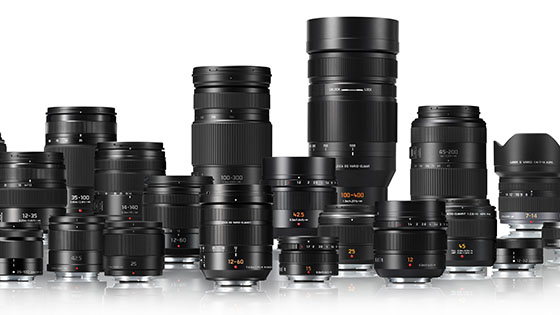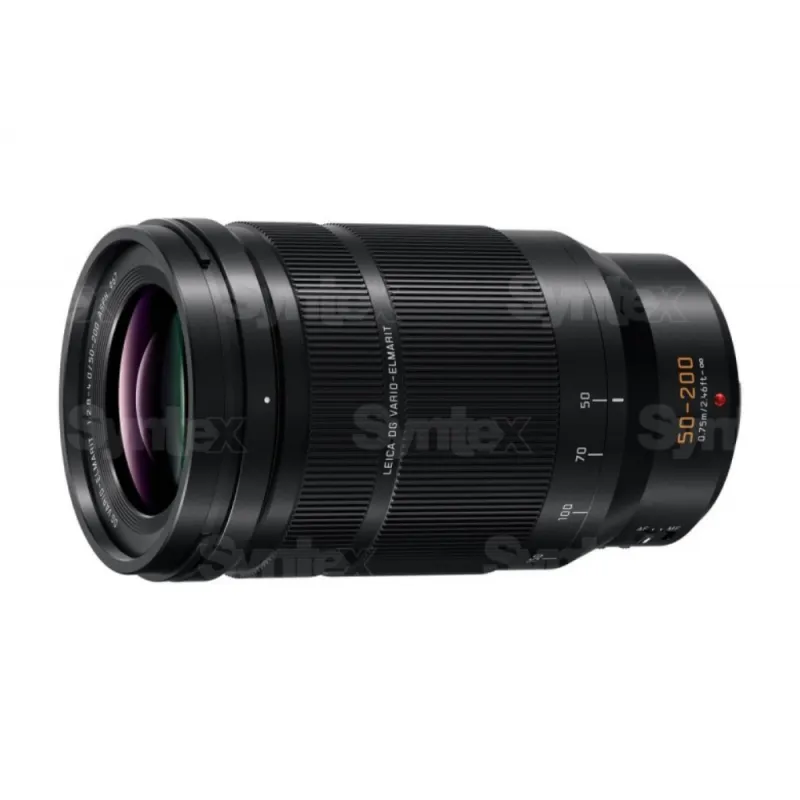Apskatīt līdzīgus produktus
Apskatīt līdzīgus produktus
| Bajonete | micro 4/3 (MFT) |
| Lens Format Coverage | Four Thirds |
| Lens Design | maināms |
| Objektīva fokusa attālums, mm | 50-200 |
| Focus Type | Autofocus |
| Image Stabilization | Ir |
| Objektīva tips | standarta |
| Maksimālā apertūra | f/2.8 to 4 |
Oriģinālais preces apraksts no ražotāja (oriģinālā valodā)
The long-awaited F2.8-4.0 LEICA DG telephoto zoom, with middle-telephoto 50mm (35mm camera equivalent: 100mm) will frame everything from beautiful portraits to ultra-telephoto 200mm (35mm camera equivalent: 400mm) wildlife photography. Maximum magnification of 0.25x (35mm camera equivalent: 0.5x) also brings you into the macro world. The stunning resolution of this LEICA DG lens renders everything clearly, from corner to corner. Designed for reliable use even in poor weather, this handy, high-quality lens is all you'll need to meet your challenges.

All of the lenses in this series feature a 9-blade diaphragm to give the aperture a rounded shape that produces an attractively smooth effect in out-of-focus areas when shooting at larger aperture settings. All lenses also take advantage of Panasonic's Nano Surface Coating technology to minimize ghosts and flaring. They boast a rugged, dust/splash-proof design and are even freeze-proof down to -10℃ to withstand professional use under harsh conditions. The high-quality video recording capability is also one of the advantages of this lens series. In late May, the LEICA DG VARIO-ELMARIT F2.8-4.0 Series lineup will expand with an additional lens, the LEICA DG VARIO-ELMARIT 8-18mm / F2.8-4.0 ASPH. Panasonic also announced plans to release a 50-200mm (100-400mm, 35mm camera equivalent) telephoto zoom lens, which is presently under development.
The linear motor enables the camera to comply with the sensor drive at max. 240 fps to take full advantage of cameras with high-speed, high-precision Contrast AF. It also helps to reduce wobbling. Notably, the new lens excels in video recording performance. In addition to the silent operation achieved by the inner focus drive system, the micro-step drive system in the aperture control section helps the camera to smoothly catch up to brightness changes when zooming or panning. The optical design achieves exceptional barycentric stability to minimize image shifts during zooming. The AF tracking performance in zooming is also improved thanks to high-speed frame analysis for focus control. Some of the F2.8-4 Series lenses are also available with the POWER O.I.S. (Optical Image Stabilizer) technology. The POWER O.I.S. effectively compensates for blurring, making it easy to shoot even in dim lighting. The lens works with the Dual I.S. (for LUMIX GX8), 5-axis Dual I.S. (LUMIX GX8), and 5-axis Dual I.S.2 (for LUMIX GH5 and G85) system when mounted on an applicable Panasonic LUMIX DSLM camera.
| Bajonete | micro 4/3 (MFT) |
| Lens Format Coverage | Four Thirds |
| Lens Design | maināms |
| Objektīva fokusa attālums, mm | 50-200 |
| Focus Type | Autofocus |
| Image Stabilization | Ir |
| Objektīva tips | standarta |
| Maksimālā apertūra | f/2.8 to 4 |
- 1. Izvērtē savas iespējas.
- 2a. Ja vēlies iegādāties tikai vienu preci ar Aizdevums.lv līzingu, tad aizpildi pieteikumu šeit
- 2b. Ja vēlies iegādāties vairākas preces vai izmantot citu līzinga kompāniju, tad liec preces grozā, un pie pasūtījuma nodormēšanas izvēlies līzinga pakalpojumu.
Piedāvājam līzingu no Aizdevums SIA, Incredit SIA, ESTO.
Konsultanti pārbaudīs grozā esošo preču pieejamību un nosūtīs aizdevuma pieteikuma saiti. - 3. Ja saņemta pozitīva atbilde, sazinies ar mums par preces iegādi. Konsultanti pārbaudīs preces pieejamību.
- 4. Ja prece ir pieejama veikalā vai pasūtāma no noliktavas, un esi saņēmis apstiprinošu atbildi no mūsu konsultantiem, dodies pie mums uz veikalu, lai noformētu pirkuma un līzinga dokumentus.
- 4a. Vari arī lūgt mums izrakstīt rēķinu par šo preci un pats doties uz kādu no līzinga devēja filiālēm, lai noformētu līzinga dokumentus*.
- 5. Kad līzinga dokumenti ir noformēti, vari doties saņemt preci veikalā (ja tā ir uz vietas) vai informēt mūsu konsultantus, lai tā tiktu pasūtīta no noliktavas.
- *Līzingā iegādātām precēm ir iespējams noformēt piegādi, tāpēc visu iegādes procesu vari veikt arī attālināti.
**Tāda pati līzinga noformēšanas soļu secība ir arī InCredit Group piedāvātajiem līzingiem.
***Neskaidrību gadījumā sazinieties ar mūsu konsultantiem!
NB! Izmantojot līzinga pakalpojumus, rūpīgi izvērtējiet savas iespējas aizdevumu atmaksāt!Nosūtīt pieteikumu
 Google
Google






